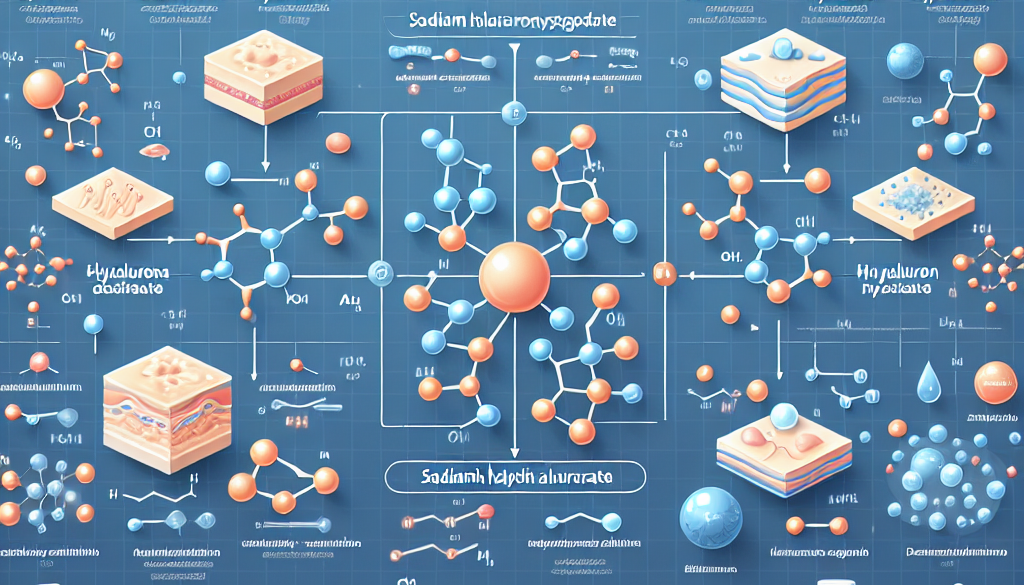Hyaluronic Acid and Sodium Hyaluronate: Key Differences
-
Table of Contents
- Hyaluronic Acid vs. Sodium Hyaluronate: Understanding the Key Differences
- Introduction to Hyaluronic Acid and Sodium Hyaluronate
- Chemical Structure and Properties
- Benefits in Skincare and Medicine
- Hydration and Moisturization
- Joint Health
- Eye Health
- Applications in Cosmetics and Pharmaceuticals
- Choosing Between Hyaluronic Acid and Sodium Hyaluronate
- Conclusion: Key Takeaways
- Explore ETprotein’s High-Quality Protein Products
Hyaluronic Acid vs. Sodium Hyaluronate: Understanding the Key Differences
In the world of skincare and medical treatments, hyaluronic acid and sodium hyaluronate are often mentioned in the same breath. Though closely related, these two compounds have distinct properties and uses. This article delves into the differences between hyaluronic acid and sodium hyaluronate, exploring their chemical structures, benefits, and applications in various industries.
Introduction to Hyaluronic Acid and Sodium Hyaluronate
Hyaluronic acid (HA) is a naturally occurring polysaccharide found in the human body, known for its capacity to attract and retain moisture. It plays a crucial role in maintaining skin hydration, elasticity, and tissue repair. Sodium hyaluronate, a salt derived from hyaluronic acid, shares similar hydrating properties but has a lower molecular weight, which influences its behavior and effectiveness in certain applications.
Chemical Structure and Properties
- Hyaluronic Acid: It is a large molecule, consisting of repeating disaccharide units of glucuronic acid and N-acetylglucosamine. This size allows it to hold up to 1,000 times its weight in water, making it highly effective in moisturizing skin.
- Sodium Hyaluronate: When hyaluronic acid undergoes a process to reduce its molecular weight, sodium hyaluronate is produced. This smaller, more stable form can penetrate the skin more easily than HA, providing more immediate hydration.
Benefits in Skincare and Medicine
Hydration and Moisturization
Both compounds are renowned for their hydrating properties, but sodium hyaluronate’s smaller molecular size allows it to penetrate the skin more deeply. This can lead to more effective hydration and immediate improvements in the appearance of fine lines and wrinkles.
Joint Health
Hyaluronic acid is a critical component of synovial fluid, which lubricates joints. As a supplement or injection, HA can help maintain joint health, alleviate pain, and improve mobility in conditions like osteoarthritis.
Eye Health
In ophthalmology, hyaluronic acid is used as a lubricant in eye drops to relieve dry eye symptoms. Its viscoelastic properties help protect the cornea and maintain moisture.
Applications in Cosmetics and Pharmaceuticals
- Topical Skincare Products: Both HA and sodium hyaluronate are used in serums, creams, and masks to enhance skin hydration and elasticity.
- Injectables: Hyaluronic acid is commonly used in dermal fillers to reduce wrinkles and add volume to facial features.
- Supplements: Oral supplements containing HA are marketed for skin and joint health.
Choosing Between Hyaluronic Acid and Sodium Hyaluronate
The choice between hyaluronic acid and sodium hyaluronate depends on the desired outcome. For deep hydration and lasting effects, hyaluronic acid might be the preferred choice due to its larger molecular structure. However, for those seeking quick absorption and immediate results, sodium hyaluronate could be more effective.
Conclusion: Key Takeaways
Understanding the differences between hyaluronic acid and sodium hyaluronate is crucial for choosing the right product for skincare or medical needs. While both compounds excel in hydration, their distinct molecular properties cater to different needs and applications. Whether you opt for hyaluronic acid’s long-lasting effects or sodium hyaluronate’s quick absorption, both offer significant benefits in maintaining health and vitality.
Explore ETprotein’s High-Quality Protein Products
If you’re looking for top-tier nutritional supplements, consider ETprotein’s range of organic and allergen-free protein products. Their extensive lineup, including organic rice protein and pea protein, is perfect for enhancing your health regimen. Contact ETprotein to explore their products and find the best solutions for your nutritional needs.
ETprotein is Sodium hyaluronate Factory Manufacturer and Supplier in China, Check further information by visiting the Sodium hyaluronate Product Page
Sodium hyaluronate Product Page
Request Quotation and Samples of Sodium hyaluronate from ETprotein
About ETprotein
ETprotein, a reputable protein and elite nutrition ingredients Sodium hyaluronate Chinese factory manufacturer and supplier, is renowned for producing, stocking, exporting, and delivering the highest quality organic bulk vegan proteins and elite nutritional ingredients Sodium hyaluronate. They include Organic rice protein, clear rice protein, pea protein, clear pea protein, watermelon seed protein, pumpkin seed protein, sunflower seed protein, mung bean protein, peanut protein. Their offerings, characterized by a neutral taste, non-GMO, allergen-free attributes, cater to a diverse range of industries. They serve nutraceutical, pharmaceutical, cosmeceutical, veterinary, as well as food and beverage finished product distributors, traders, and manufacturers across Europe, USA, Canada, Australia, Thailand, Japan, Korea, Brazil, and Chile, among others.
ETprotein specialization includes exporting and delivering tailor-made protein powder and finished nutritional supplements. Their extensive product range covers sectors like Food and Beverage, Sports Nutrition, Weight Management, Dietary Supplements, Health and Wellness Products, and Infant Formula, ensuring comprehensive solutions to meet all your protein needs.
As a trusted company by leading global food and beverage brands and Fortune 500 companies, ETprotein reinforces China’s reputation in the global arena. For more information or to sample their products, please contact them and email sales(at)ETprotein.com today.












